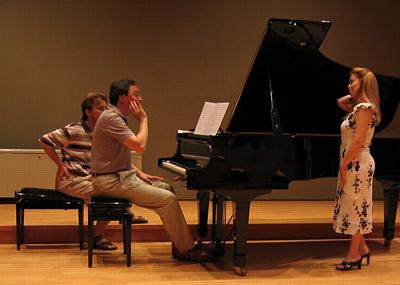|
<< -- 5 -- Tess Crebbin DIVING INTO THE MUSIC

TC: Are there any role models you have oriented yourself on, other accompanists you specifically admire, perhaps?
WR: Someone who was and still is a role model for me is Gerald Moore. He has set standards that continue to be valid to this day. The way he manages to get to the core of a piece through his interpretation of it! He does so in a very modest, self-deprecating, British way. He enriches the singer and the piece to an incredible extent, always coupled with this wonderful sense of British humor that I like about him very much. I have tried to learn from his way of approaching music: with a combination of depth and humor.
TC: So many great singers have established long-lasting partnerships with you. Thomas Hampson, Barbara Bonney, Thomas Quasthoff ... the list goes on and on. Who do you feel you have learned from the most?
WR: You learn something from each singer you work with. It would be impossible for me to highlight just one or two of them. As far as other influences in my musical life, aside from my teachers, I feel that I have learned a lot from Hans Hotter when I assisted him in his courses although I never accompanied him. I have also learned a lot from Brigitte Fassbänder, especially since she was the first of these great singers I worked with. And now, for the past eleven years, there is this very enriching team with Thomas Hampson. From all the singers I have worked with, there is always some aspect I learned about the following quest: how do I get into the depth of the music, how can I get really close to that? And then: never giving up in the quest to really understand music at its profoundest level.
TC: You also worked with Dietrich Fischer Dieskau, the predecessor of Thomas Hampson as a star-baritone. He is such a legend. What was he like? Arrogant? Standoffish?
WR: Quite the opposite. I met him for the first time when he was doing one of his courses at the music academy in Berlin. I travelled there with some fellow students from Munich. He is very kind and when working with him, he can be very warm as a person. In his private life he maintains a healthy distance, but in a friendly way. He has such an amazing air about him that it rubs off on you, just being around him. He influences, merely by being there and by being the man he is. From him I learned a lot about ordering my thoughts, both musically and personally. It was all about never giving up. He taught me a very handy approach to dealing with problems: if you think you have found a solution that seems to fit, don't make it so easy on yourself. Think again. Maybe there is a better solution out there, somewhere. It was a wonderful time with him that I do not want to miss in my life. We worked together over a period of two years, off and on. Later, our contact became more sporadic but we still had occasion to work together every once in a while. Even when we were no longer working with each other, he still remembered me and helped me when I needed anything. We stay in contact with each other, mainly through his wife who teaches at the same school as I do.
TC: After Fischer-Dieskau, Thomas Hampson has taken over as the world's star baritone: voice, performance skills, looks and acting quality ... he has it all, just like Fischer-Dieskau did. Once again, you are part of the package. But with Hampson there is a genuine friendship in private life also?
WR: Yes, we really are friends. When we are on tour we do things together in our spare time. We might go to the museum or on an excursion. That is very nice when you share a lot of things with each other outside the concert hall. It was the same with Brigitte Fassbänder. We also went to museums and exhibitions together when we were on tour.
TC: As an accompanist, do you feel it makes a difference to the quality of the performance when there is a personal friendship with the singer?

Rieger discusses a student's interpretation.
|
WR: I don't think so. It just makes it nicer when you are on the road and have to fill in your spare time. But there is no need for singer and accompanist to be close friends. You have to like each other, true, or it doesn't work. You'd soon part company if there were not at least a basic sense of liking each other. This is different with Lied than with opera. With Lied, you are very much dependent on one another. There are only the two of you. It is a bit like two people climbing a mountain together. You depend on each other. With Lied, you can envision that singer and accompanist are connected through an invisible rope. If you don't like the other, you don't let go of the rope and let him fall down, but you may not be sufficiently in tune with him to help him, as if by reflex, when something goes wrong. I cannot imagine making music with someone whom I do not like. Luckily, this has never happened to me. It is also impossible to work with someone who is on a musical path that you do not agree with.
Continue >>
Copyright © 29 July 2004
Tess Crebbin, Germany

|

